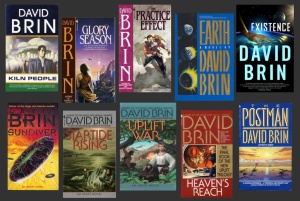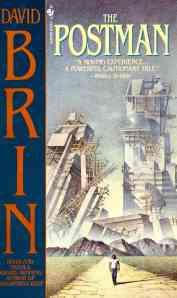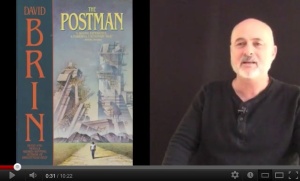Exactly 20 years ago today, Kevin Costner released his film
based on my novel The Postman into
theaters. (The Postman is the only science fiction saga to come in second for three successive Hugo Awards; it's in 25 languages
around the world.)
I’ve written elsewhere my complex opinions about Costner’s
flick… see my essay on the book vs. the movie, which emphasized the positive, in order to help give the maligned and under-appreciated film whatever small boost that I could…
...but let’s do a capsule summary of the pros and cons, a very personal view of minuses and plusses.
...but let’s do a capsule summary of the pros and cons, a very personal view of minuses and plusses.
Minus: The Postman hit theaters the
very same week as “James Cameron’s silly remake about a sinking boat.” KC’s
words, I kid you not! He released it the… same… weekend… as… Titanic. I doubt there is a more
wince-worthy example of poor timing in Hollywood history. (And yes, one of
these two motion pictures is being feted right now, for its 20th
anniversary. The other hit an iceberg.)
On the plus side: For all its faults, I deem the Postman film to be one of the dozen or
so most beautiful motion pictures -
both visually and musically - ever made. Costner has a genius eye and ear!
Working with cinematographer Stephen Windon and composer James Newton Howard -
he created a sensory masterpiece.
Minus: In collaboration with screenwriter Brian
Helgeland, the plotting, characters and pacing were terrific for about 2/3 of
the show. Alas though, chaos started creeping in, toward the end - a
floundering that could have been solved over some beers with … well… maybe a
consultant who knows the story pretty well?
Alas, Costner’s behavior toward the original author was inexplicably, unnecessarily brusque and ultimately self-destructive. I
never publicly complained – and in fact, KC admitted later that I was a “team
player,” trying hard to help promote the film. But I’ve since learned that people
noticed. It didn’t help.
Plus: The worst thing you can do to the
original author is to betray the core meaning of his or her book. But I
have no such complaint! In fact, I was astonished how well Costner and Helgeland
conveyed the heart of my story… about a flawed and fretful hero who
feels guilt over telling a beautiful lie, in order to survive. A lie that comes
true, by reminding other survivors that they were once mighty beings called
citizens.
This powerful message - running diametrically and deliberately opposite to
every Mad Max cliché - pervades both the book and the film, and KC's “Postman”
character essentially is my character, Gordon – perhaps with fewer IQ points, and no name -- but the same soul.
It’s a message that we especially need in these times…and
for that one fact, I gladly and openly forgive every complaint! I defend and
will always be proud to be associated with this motion picture.
See also: A Reader's Guide to The Postman novel.
Minus: One must simplify for the screen.
Costner cut out the ersatz AI computer (“Cyclops”) and the garish sci-fi augments
and several other plot elements from the book. Perhaps he expected me to gripe
about that, but I agreed with every one of those cuts! (I never got a chance to
tell him that.) Alas, though. Perhaps it wasn’t necessary to scoop out and
throw away quite so much of the book's brains?
A side gripe: when I visited the set in Arizona… getting
eighteen whole words from him… he couldn’t have told an underling to: “Throw a Holnist
uniform on this bozo and give him a cameo. Put him in formation with the others
in our next scene, and tell him to stay quiet”? That woulda killed him? Ah,
never mind that.
A side irony: I never minded the Tom Petty scene.
Kinda liked it, in fact. And I miss him.
Okay so we have “gorgeous, big-hearted and dumb.”
Hey, worse things have happened to a novel that gets filmed! Often lots worse. (Though Andy Weir and Ted Chiang got to be a whole lot more delighted with their experiences. Yes, including the money.)
Hey, worse things have happened to a novel that gets filmed! Often lots worse. (Though Andy Weir and Ted Chiang got to be a whole lot more delighted with their experiences. Yes, including the money.)
What is the sum of all these plusses and minuses? Overall positive. I’d be happy to be a
team player in some future movie. Yes, even if I’m sent to the Kids’ Table as
the “mere author.”
The capper to all this is my one top benefit from this
experience.
More book sales? Well, a bit. But box office flops don’t
give books much leg.
No, the most lasting benefit from this experience was
something simpler.
It gave me a story to tell folks on airplanes.
Priceless.
Priceless.







